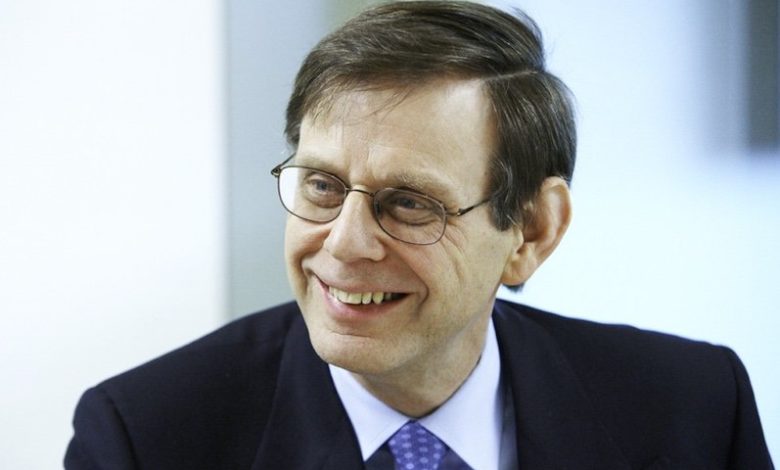Stopford on Maersk and methanol

The world’s most famous shipping economist, Dr Martin Stopford, the non-executive president of Clarkson Research Services, writes for Splash today, reacting to the news from Copenhagen where Maersk has put down a $1.4bn bet on methanol powered boxships.
It is 15 years since the Emma Maersk was launched. With her 109,000 hp engine and 25.5 knot design speed, she was the beginning of the big gas guzzler generation. So it’s great that Maersk is now taking this initiative to build methanol powered ships, but how green are they? And is it really a revolution?
Let’s start with the green issue. How green is methanol? It’s a hydrocarbon fuel and when burnt in a marine diesel engine it produces almost as much CO2 as heavy fuel oil (VLSFO). LNG and LPG both perform better. What makes methanol different is that it is not extracted from the earth, it is manufactured. If the manufacturing process uses green energy such as biomass, wind or solar, the methanol produced is green. Otherwise, it is just another hydrocarbon producing big CO2 emissions.
The real revolution is Maersk’s aim to negotiate a zero carbon freight premium, which shares the cost of the $2,000 a tonne green fuel with shippers
By placing contracts for green methanol, Maersk is helping to stimulate production, which is great for the environment. But it is not straightforward. There is serious competition for the limited supply of green energy needed to make green methanol and the conversion process is inefficient (40-70% of the energy is lost). So making methanol for ships may not be the best way to use this scarce resource.
Green methanol is also expensive. Maersk says it could cost $1,000 a tonne, and it takes two tonnes of methanol to do the work of one tonne of HFO (19.7 MJ/kilogram compared with 41.8 MJ /kilogram for HFO) which pushes the ‘real’ price up to $2,000 a tonne, so shippers must expect to pay a lot more for ‘green transport’.
From a risk perspective, Maersk gets a lot of bang for their buck. Methanol burns easily in internal combustion engines and the new ships can switch between VLSFO and methanol. This is mature technology (I used to make model aircraft with tiny engines burning methanol). So, if the methanol doesn’t work out price-wise, the ships can switch to VLSFO and have not lost much.
Overall, Maersk should be congratulated for showing the world that shipping is serious about the environment, at a time when there’s not much green maritime technology on offer. But although it sounds revolutionary, it is just using established technology and a scarce supply of green energy to manufacture a hydrocarbon fuel that can be burnt in a ship. There are already about 20 ships in service or on the orderbook. And there are many small plants in operation or under development worldwide, producing green methanol.
The real revolution is not the fuel – there is still a long way to go on that front. It is their aim to negotiate a zero carbon freight premium which shares the cost of the $2,000 a tonne green fuel with shippers. The liner companies need the shippers as financial partners on the voyage to zero carbon in 2050 and this would get the show started.
As Rod Stewart put it “The first cut is the deepest” and who better to make it than Maersk?
For more on what Maersk’s methanol announcement means for shipping, check out the August issue of Splash Extra.

Methanol is a distilled product, which is being distilled from or oil or bio products like sugar, grain, mais etc under high temperatures of minimum 78 degrees C or higher, which needs a huge amount of heating.
My fear is that in future when so much large quantities ethanol is needed to burn in engines, a part of the worlds food commodities like beets, grain or cane will be used to produce Methanol instead being used for consumption.
Besides that the costs per liter will be much higher then the cost of present carbon fuels.
Besides this bunkering of Methanol is quit somewhat more dangerous than bunkering oil, and accidents (explosions) can be expected during bunkering operations.
The use of biomass for any production of energy is costing us our woods and wood as meantime has become very clear from press information and other sources.
This development must be stopped before it is too late.
Thinking green and clean is good, but a large part the world has lost any reasonable thinking, regrettable some shipowners seemingly as well now.
The feedstock question is important. Feedstocks from food-competing biomass is inacceptible. Maersk will have taken that in consideration. But the question remains, how to control and certify the adequate feedstock?
My concern further is also the high energy consumption to build eFuels, even if it is taken from renewable sources.
A lot of research and a massive built up of production plants has to take place.
Beet is for sugar, as is cane, which is not required in a healthy diet. We can do without it. Much of the grain goes to feeding cattle for meat, which we can do with much less of.
“The use of biomass for any production of energy is costing us our woods” Compared to palm oil and beef?
Let’s hope that Stopford’s methanol prediction is better informed than his prediction about Conair porthole reefers in 2001.
By the way, it wan’t Rod Stewart who wrote the song – it was written and recorded by Cat Stevens.
Good perspective. It is a move in the right direction as doing nothing, which many seem to advocate, would be a total disaster. I would have expected Maersk to have been involved in the nuclear power m-MSR research.
Corretíssimo